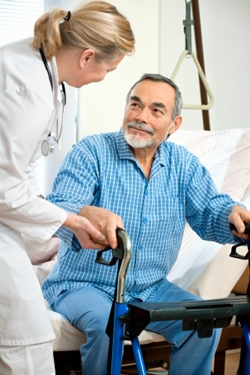 Most people entering their golden years find that their body is moving a little slower these days. For men, however, there are a few distinctive health concerns to start thinking about on top of the general wear and tear.
Most people entering their golden years find that their body is moving a little slower these days. For men, however, there are a few distinctive health concerns to start thinking about on top of the general wear and tear.
If you are helping an older man in your life transition into a new living situation, such as assisted care, his overall health is likely to be a determining factor in the community you choose. It will be helpful for you to learn as much as you about those health conditions that the man you love-- husband, brother or father-- will face with age.
Incontinence
This problem affects both genders, but for men it can be a sign of a prostate condition or nerve damage, according to Medicine.Net. As with women, there are different classifications for urine leakage.
- Stress incontinence
- Urge incontinence
- Overflow incontinence
Men can develop all of these forms of incontinence as they age. The first step in any treatment plan will be to eliminate a more serious case for the condition, so make sure that your loved one's doctor is aware of any bladder issues.
Prostate Problems
A healthy prostate is about the size of a walnut, but as they age, men can face prostate enlargement or prostatic hyperplasia which puts pressure on the bladder and urinary tract, causing irritation and narrowing.
Although it can be a relatively benign condition, prostate enlargement can still cause inconveniences. For example, a man with an enlarged prostate may find that he needs to take more trips to the bathroom or find it difficult to go.
Depression
Women have menopause, but for men, there is aging male syndrome-- caused by a reduction in testosterone production. During the early years of his life, high testosterone fuels reproduction. Later on, however, that much hormone may become biologically unnecessary.
Symptoms of aging male syndrome include:
- Weight gain
- Difficulty sleeping
- Loss of sex drive
- Irritability
- Lack of concentration
- Loss of energy
- Reduction in bone density
Low testosterone can also be a symptom of a more serious illness, so a conversation with his doctor should be part of your care strategy, especially if his mood changes suddenly.
Hearing Loss
Medscape reports hearing loss is the third most common problem for the elderly. Approximately 30 percent of men over the age of 65 will experience a change in their ability to hear with causes that vary from lifestyle to disease.
For most, however, this loss is a gradual progression that seems to be part of the aging process.
Over time, little things like background noise begin to take over as he is trying to focus on what someone is saying. If he is always asking you to turn up the television or doesn’t seem to understand the things you tell him, this may indicate age-related hearing loss.
Memory Loss
Alzheimer’s affects a disproportionate number of seniors, both men and women, and there is evidence that indicates the disease progresses differently in men.
Experts in gender-specific medicine have found that men lose more volume in the hippocampus– the area of the brain responsible for creating new memories – than women. Men with Alzheimer’s, therefore, tend to have increased problems with short-term memory, but will be less likely to forget their name or who is in their family.
There is good news if your loved one is facing the possibility of Alzheimer's.
Even people who have already started to show signs of mental decline improve their odds by increasing activity. That is one reason assisted care can be the best choice-- especially in a community setting. The professional care staff encourages exercising, daily walks and recreational sports to improve the blood flow to the brain, strengthening the neural connections. Some communities even offer distinct memory support programs.
You can’t do much about him growing older, but you can help him find solutions for the problems that come with aging. Assisted care, in particular, can facilitate his independence and help improve his odds of living well during this time of his life.













